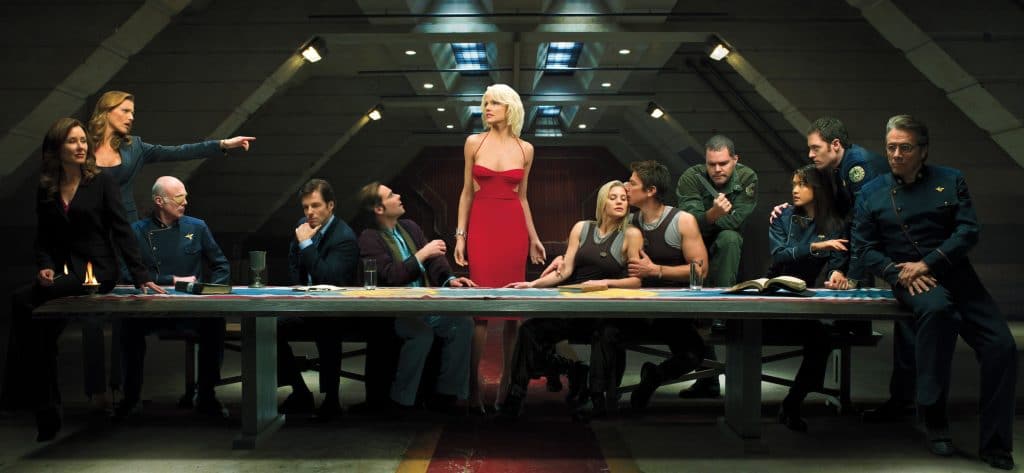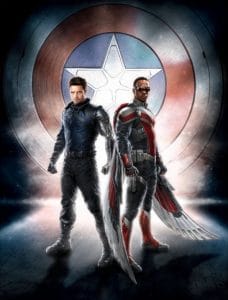The Marvel Universe is a genre sponge. It soaks up everything like a kitchen sponge, only to wring it out onto the page by writers. Marvel is wide and deep enough to contain every genre, then toss in an enameled cast iron farm-style kitchen sink.
Why am I confident to say this? Well, Captain America was once turned into a wolf, Spider-Man bumps into vampires, and Doctor Strange casts spells. There are cowboys in the Marvel universe as well as space cultures. The Marvel Universe can handle it all. I realize this is obvious, but it is woefully taken for granted and not celebrated as the strength it is. I dare you think of pretty much any genre–no matter how weird or obscure–and I bet Marvel comics has dabbled in it.
The genre that Marvel features heavily is Military Sci-Fi, something they obviously excel in as evidenced by Captain America: Winter Soldier and many more, but a genre that they get to push further in The Falcon and the Winter Soldier on Disney+.
So, let’s use this edition of Genre Watch to give you an overview on why Military Sci-Fi is so popular and engaging, not just in the hands of Marvel, but throughout the history of the genre. Weapons drawn.
![]() What is Military Sci-Fi?
What is Military Sci-Fi?
Military science fiction is a sub-genre of science fiction that features the use of science fiction technology, mainly future-tech weapons or perhaps cybernetics or robotics. Military Sci-Fi might be set on Earth in the year 2050, for example, with would allow for the presence of future tech or it could be set in space. In the case of Marvel, military sci-fi works excellently as a sub-genre of the superhero genre.
The protagonists in military sci-fi are often soldiers or former soldiers. If it is written, scenes often provide detailed descriptions of conflict, plus you get intentional looks at the tactics and weapons used. If it is visual media, military sci-fi is most often firmly in the action/adventure category with broad action sequences filmed to display the future-tech.
Military sci-fi often features actual past or current Earth conflicts, yet substitutes key details or characteristics to present it from an alternate point of view. Battleships might be replaced by spaceships for example, machine guns by laser weaponry, or countries substituted for planets or galaxies. In the case of Captain America: Winter Soldier, Hydra was a stand-in for the popular trope of evil organization that infiltrates a government from the inside.
![]() Military Sci-Fi Timeline
Military Sci-Fi Timeline
- 1959: Robert A. Heinlein published Starship Troopers, a classic in the genre that is set in a future society gripped by an interstellar war between humans and an alien species.
- 1969: Slaughterhouse-Five by Kurt Vonnegut is published and draws on Vonnegut’s own military experience and his time as a German POW during WWII to tell the life story of Billy Pilgrim, even going as far as an alien zoo on the planet Tralfamadore.
- 1974: The Forever War is released by American author Joe Haldeman as a portrayal of the author’s military service during the Vietnam War by telling a story about human soldiers fighting an interstellar war against an alien civilization known as the Taurans.
- 1979: Alien is a military science fiction film directed by Ridley Scott that also introduced a horror element by following the crew of a spaceship that encounters and deadly extraterrestrial set loose on the ship.
- 1987: The 1st edition of Warhammer 40,000, a miniatures wargame produced by Games Workshop, was published.
- 1994: Harry Turtledove’s 8-volume Worldwar series depicts an alternate history in which WWII is disrupted by extraterrestrials invading Earth in 1942
- 1995: Command & Conquer, a real-time strategy (RTS) military sci-fi video game, was released worldwide by Westwood Studios.
- 2005: Old Man’s War by John Scalzi is published. 75-year-old John Perry joins the Colonial Defense Forces.
- 2005: The first issue of Ed Brubaker’s comic book run on Captain America begins. It has a deep military sci-fi vibe that first tells the story Winter Soldier that we’ve seen in the movies this past decade.
![]() My Personal Happy Place
My Personal Happy Place
I realize 82% of readers will go narcoleptic at the mere mention of the word “history,” but let’s have some fun with this. If you’ve watched or read pretty much anything in the past several decades then you likely have a military sci-fi favorite, unless you are 100% Hallmark movies all the time. Indeed, it’s truly nigh impossible to overstate the influence military sci-fi has had on nerd-dom, so let’s spare a thought for the various iterations and contributions over the past decades.
In fact, military sci-fi is one of my personal nerdy happy places. So many of my favorite books as I’ve grown up are military sci-fi. And some of my favorite television shows like Battlestar Galactica or Firefly are firmly in the genre or bend it in some way.
I impinge it’s the same for many of you. Military sci-fi is truly one of the most enduring genres.
![]() The Falcon and the Winter Soldier
The Falcon and the Winter Soldier
The Falcon and the Winter Soldier is firmly in the military science fiction genre; the poster child, if you will. The Falcon is ex-military and adventures using future flight tech, buttressed by gadgetry like HUD displays and drone weaponry. Winter Soldier has a bionic arm and has been augmented by a chemical concoction that heightens his abilities. The characters very well could appear in Starship Troopers of Old Man’s War, they just happen to work wonderfully as part of the genre-sponge that is Marvel Comics.
There will be a heck of a lot of action during The Falcon and the Winter Soldier, as action is a hallmark of the genre. The action will only be interrupted by character moments that examine the effects that the action has on the character’s psyches, the other hallmark of the genre.
That puts the The Falcon and the Winter Soldier in a perfect place as well as an uncomfortable place. It’s a perfect place because military sci-fi is so beloved as a genre that creators don’t want to do too much much to mess with the formula. Audiences love military sci-fi, so why not give them exactly what they want? Rather than try to break a mold with military sci-fi, just create the best product you can within the genre.
But it’s an uncomfortable place because audiences also have a way of taking things for granted. Think about it, F&WS follows WandaVision, a show that is truly unique, being the only example of a superhero / witch / sitcom / grief story that I know of. That’s a tough act to follow for F&WS, a show that is firmly in a well-known genre. So audiences will likely cast stones at F&WS for a lack of creativity, even as they enjoy it immensely for being dead-center in the incredibly popular military sci-fi genre.
![]() Seeing is Believing
Seeing is Believing
If you want to see military sci-fi in action, watch this clip from Captain America: Winter Soldier.




